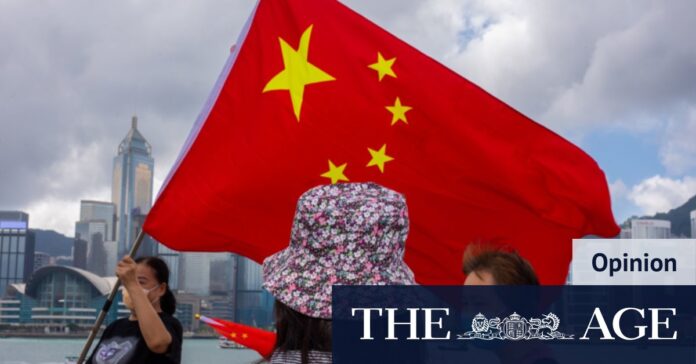[ad_1]
The tax rise is in response to Hong Kong’s ballooning deficit, which is projected to be HK$101.6 billion by the end of March – nearly twice what was estimated a year ago.
In the past, the government has relied heavily on land sales to boost its income but demand has slumped. It has sold less than a quarter of what it hoped to in its current financial year, which ends in March.

The theme is explored in the recent Amazon Prime TV series Expats, starring Nicole Kidman.Credit: AP
The tax rise is small in the grand scheme of things. It will affect less than 1 per cent of all taxpayers in Hong Kong. But it exemplifies two much larger trends.
Once a major global, free market hub, Hong Kong is slowly turning its back on Western capitalism and its economy is paying the price.
Loading
“The peak position Hong Kong occupied over the past two decades, it has ended,” says Max Zenglein, chief economist at Germany’s Mercator Institute for China Studies.
The turning point was 2020, when China forced through a new national security law that massively reduced Hong Kong’s autonomy and criminalised protesters who called for democracy and freedom of speech.
“Hong Kong is turning against Western liberal values, democracy and human rights,” says Steve Tsang, director of the SOAS China Institute.
At the same time, Hong Kong’s hardline pandemic response drove many expats away.
“2022 was awful,” says real estate consultant Jonathan Benarr, who moved to Hong Kong in 2014. “The COVID restrictions and quarantine requirements just stifled life, so there was quite the exodus. Lots of expats left.”
The economy and Hong Kong’s international status have not recovered from the twin blows.

Hong Kong’s decline poses a problem for China’s President Xi Jinping.Credit: AP
Retail sales at the end of last year were down by a fifth compared to 2019. The economy grew by 3.2 per cent in 2023, far below early official expectations of 5 per cent. Hong Kong’s stock market has declined steadily to lows last seen during the global financial crisis.
The slump is being made worse by the dire state of China’s economy, which is suffering from sluggish growth rates and a years-long property crisis.
“A lot of investment used to be funnelled through Hong Kong to China. Now the foundations of Hong Kong’s old growth model are on shaky ground,” says Zenglein.
The region’s decline poses a problem for China’s President Xi Jinping.
“China needs on some level a Hong Kong that remains as a global financial centre,” says Bill Hurst, Chong Hua Professor of Chinese Development at the University of Cambridge.
“But it is desperate to control the situation in terms of politics and regulation and, ultimately, I think that the second set of goals is probably more important.”
Zenglein believes the decline of Hong Kong is part of a wider plan to build a new economic axis with Beijing’s allies, such as Saudi Arabia and the members of China’s Belt and Road Initiative.
“It is trying to establish Hong Kong as a crucial hub for a new form of international project.”
Still, the city is keen to improve its image.
Once a major global, free market hub, Hong Kong is slowly turning its back on Western capitalism and its economy is paying the price.
Lionel Messi’s Inter Miami team, which is co-owned by David Beckham, was flown in earlier this month for a match with a local team in an event that was supposed to show Hong Kong still had star-power. However, the event was a car crash.
Messi failed to play, spending the match on the bench. He blamed a groin injury, but played a match in Japan a few days later. Chinese fans were enraged.
Hong Kong’s struggle to relaunch itself is a reflection of how quickly and dramatically the environment has changed.
Since the 1970s, Hong Kong has had a light touch regulatory environment. There was little in the way of government fees or taxes on commerce. The cost of making deals was extremely low. It has also had a sound, reliable legal system. It became a global hub for deal-making.

China’s hardline COVID stance drove an exodus from Hong Kong.Credit: Bloomberg
“All of that is either changing or is at least perceived to be under threat of changing,” says Hurst.
Business confidence in Hong Kong is being eroded, warns Tsang: “Multinationals can see that the independence of the judiciary is being eroded. They are worried about the direction of travel, and that matters for people making long-term investment decisions.”
Anecdotally, companies are moving operations out of Hong Kong. Zenglein says: “It doesn’t really show up in figures because I think companies don’t want to be vocal about it. This is happening behind the scenes.”
The shifting sands mean Hong Kong is reorienting away from the West and towards Beijing.
“The Hong Kong financial sector is geared more towards China and Chinese stakeholders,” says Zenglein.
Eighty-four per cent of the people hired under Hong Kong’s qualified migrant scheme came from mainland China in 2017. This figure has now jumped to 94 per cent.
However, even the Chinese are wary of the crackdown in the region, claims Zenglein.
Loading
“Just put yourself in the position of a wealthy Chinese person who has their money in Hong Kong. Would you feel it is particularly safe there? Probably not.
“And while you have your money in Hong Kong, you might as well use the still existing free capital controls to move it elsewhere.”
Benarr agrees: “Even the Chinese don’t consider Hong Kong the safe haven it once was.”
He left in February 2022 and has no intention of coming back. “It’s not the same city,” he says. “The magic of the place has been severely impacted.”
[ad_2]
Source link


